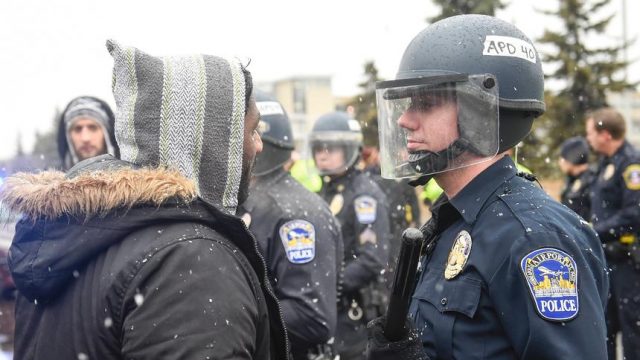John Andrist: Tying the Shoes of a Policeman

A member of the Black Lives Matter protesters argues with a police officer as they shut down the main road to the Minneapolis St. Paul Airport following a protest at the Mall of America in Bloomington, Minnesota December 23, 2015. REUTERS/Craig Lassig
The historical consensus appears to be that the Vietnam war was a gigantic mistake.
All the more, that makes the men and women who served — and particularly those who lost their lives — are exceptional heroes, because they served their country out of a really pure loyalty.
It was terribly disheartening to see the negativism that greeted Vietnam servicemen when they came home. After all, if it was a mistake, it most certainly was not their mistake.
So it is with our police. Too many responsible people have made them the villains of the racial stereotypes that divide us.
But one battle we are winning, I think, is a better understanding of how much we need to treasure their role in this too often violent society.
And we need to tell them, reassure them, of their value as much as their responsibility.
A Minnesota Highway Patrol officer climbing into his patrol car found a note under his windshield the day after the Dallas shootings. It was a prayer for his safety.
In the courthouse cafe at nearby Williston, policemen stopped in for lunch, and learned an anonymous person had picked up their tab.
These are the voices of most of us. We need to use them to drown out the hateful, indiscriminate hate reactions of those who are the true racial bigots.
[mks_pullquote align=”right” width=”300″ size=”24″ bg_color=”#ffffff” txt_color=”#000000″]Brand a whole occupational class because of a few reckless overreactions? That’s bigotry.[/mks_pullquote]
Brand a whole occupational class because of a few reckless overreactions? That’s bigotry.
Moreover, there is growing evidence that a bigger factor behind the indiscretions is fear, rather than racism.
One mental health scientist has made this believable hypothesis.
He says policemen have a significant fear of blacks, particularly very large blacks.
It matters not what the reason is or whether it is rational. Fear is fear.
When facing resistance an arresting officer is more likely to react too hastily in the presence of a fear factor, the scientist says.
That seems more logical to me, because almost always police do not react, absent the element of being resisted or disobeyed, which would trigger the stress and fear factors in any of us.
When we put ourselves in the shoes of a policeman, stopping a vehicle in the hours of darkness, isn’t it logical that a stimulated fear increases the potential for conflict?
The expressions of hate and outrage from blacks, while understandable, only reinforce those fear factors.
Financial debacle?
I’m not a fan of a special session of the legislature to deal with the state’s money crunch.
For one thing, it is extremely costly to bring 150 legislators to Bismarck. The work that will be done is largely that of the appropriations committees, which number between 30 and 40 of the members.
The rest are only the yes and no men (and women).
Better to have a comprehensive plan to present to them in a single bill at the time they arrive. Then the body can debate the detail, and discuss any amendments.
No matter what they decide there will be pain and anguish. That’s a given with any kind of spending reduction.
When Ed Schafer was called in to fix the UND mess, nobody liked all of his decisions, including me.
But faced with a no-win situation the over riding need is for a decision maker, not a committee of 141.
The rest of us have to understand what they are facing is not the result of poor management, but of changing markets that cannot be controlled, nor rarely forecasted. Petty political party arguments are useless and unproductive.
Finally, we need to understand decisions are usually temporal. If and when conditions change, restoration is possible.
Take comfort that in the last two or three sessions they have filled a number of cream cans, without which we would be learning what extreme austerity is like.
Changed perspective
It’s interesting how North Dakota’s oil boom has changed our perspective on so many related things.
Now when gas prices rise it still stings, but somehow also feels good. Call it sweet and sour. I mean prices, not the crude oil.
When the talking heads showed us pictures and talked about record travel this summer, I was tempted to say, “Burn, baby, burn”.




